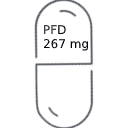Uses
Pirfenidone is used for the treatment of idiopathic pulmonary fibrosis (scarring of the lungs with an unknown cause). Pirfenidone is in a class of medications called pyridones. It is not known exactly how pirfenidone works to treat idiopathic pulmonary fibrosis.
Side Effects Of Pirfenidone
Pirfenidone may cause side effects. Tell your doctor if any of these symptoms are severe or do not go away:
- nausea
- vomiting
- diarrhea
- heartburn
- stomach pain
- headache
- dizziness
- pressure or tenderness in the sinuses
- difficulty falling asleep or staying asleep
- joint pain
- weight loss
Some side effects can be serious. If you experience any of these symptoms, call your doctor immediately or get emergency medical treatment:
- rash
- extreme tiredness
- unusual bleeding or bruising
- lack of energy
- loss of appetite
- pain in the upper right part of the stomach
- yellowing of the skin or eyes
- dark or brown (tea-colored) urine
- flu-like symptoms
- swelling of the face, throat, tongue, lips, eyes, hands, feet, ankles, or lower legs
- hoarseness
- difficulty swallowing or breathing
Pirfenidone may cause other side effects. Call your doctor if you have any unusual problems while taking this medication.
Warnings & Precautions
Before taking pirfenidone:
- tell your doctor and pharmacist if you are allergic to pirfenidone, any other medications, or any of the ingredients in pirfenidone capsules. Ask your pharmacist or check the manufacturer’s patient information for a list of the ingredients.
- tell your doctor and pharmacist what other prescription and nonprescription medications, vitamins, nutritional supplements, and herbal products you are taking or plan to take. Be sure to mention any of the following: carbamazepine (Carbatrol, Epitol, Equetro, Tegretol, Teril); cimetidine (Tagamet); ciprofloxacin (Cipro); digoxin (Lanoxin); enoxacin (Penetrex); fluvoxamine (Luvox); or rifampin (Rifadin, Rimactane, in Rifamate, in Rifater). Your doctor may need to change the doses of your medications or monitor you carefully for side effects.
- tell your doctor if you have or have ever had liver or kidney disease.
- tell your doctor if you are pregnant, plan to become pregnant, or are breastfeeding. If you become pregnant while taking pirfenidone, call your doctor.
- tell your doctor if you use tobacco products. Cigarette smoking may decrease the effectiveness of this medication. You should stop smoking before you start taking pirfenidone and avoid smoking during your treatment.
- plan to avoid unnecessary or prolonged exposure to sunlight (including sunlamps and tanning beds) and to wear protective clothing, sunglasses, and sunscreen (SPF 50 or higher). Pirfenidone may make your skin sensitive to sunlight. Ask your doctor or pharmacist about avoiding other medications that may make your skin sensitive to sunlight. If your skin becomes reddened, swollen, or blistered, like a bad sunburn, call your doctor.
Pirfenidone Dosage
Pirfenidone comes as a capsule to take by mouth. It is usually taken with food three times a day. Take pirfenidone capsules at around the same times every day. Follow the directions on your prescription label carefully, and ask your doctor or pharmacist to explain any part you do not understand. Take pirfenidone exactly as directed. Do not take more or less of it or take it more often than prescribed by your doctor.
Your doctor will start you on a low dose of pirfenidone and gradually increase your dose over a 2-week period.
Your doctor may need to decrease your dose or stop treatment if you experience certain severe side effects. Be sure to tell your doctor how you are feeling during your treatment.
Ask your pharmacist or doctor for a copy of the manufacturer’s information for the patient.
Other
Keep all appointments with your doctor and the laboratory. Your doctor will order certain lab tests to check your body’s response to pirfenidone.
Do not let anyone else take your medication. Ask your pharmacist any questions you have about refilling your prescription.
It is important for you to keep a written list of all of the prescription and nonprescription (over-the-counter) medicines you are taking, as well as any products such as vitamins, minerals, or other dietary supplements. You should bring this list with you each time you visit a doctor or if you are admitted to a hospital. It is also important information to carry with you in case of emergencies.
Source
All information has been provided courtesy of MedLinePlus from the National Library of Medicine and from the FDA.



